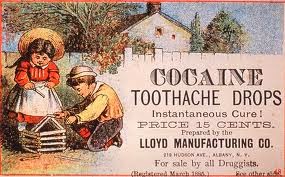So, do you think marketing has changed much over the last, say, 50 years? Here are some advertisements that featured from around that era. I think it is fair to say these emphasise the dramatic changes in how brands communicate with their audience.
 |
Ethics and corporate responsibility have become a dominant feature of modern marketing and rightly so. Cigarette brands are not permitted to promote their products at all in many countries (including Ireland) and the sale of such death-inducing products take place in what is often referred to as a 'dark-market'. The other reason this communication would not work in the modern era is because consumers have become much more savvy. They don't just believe advertisements but question what they see, even if a doctor apparently endorses the featured product. (Perhaps it also tells us that doctors have got a little bit smarter in that time too.)
I bet she won't. In fact, producing this on Christmas day morning is more likely to result in its use as a weapon rather that a household appliance. (Although the young lady in the advertisement does look happy, it has to be said). The role of women in most western countries has changed. No longer is it acceptable for us men to convey sexist remarks that stink of inequality (and, again, rightly so). Although, I do dare the Marketing Manager at Hoover to re-run this campaign. Just don't reveal your identity as doing so could greatly reduce your life expectancy.
Everybody knows Coca-Cola is really good for you, right? And what could be a better start in life for your treasured little ones than a regular intake of caffeine mixed with about thirty odd spoons of sugar? Marketing communications aimed at children have become extremely strict in recent times, especially concerning high-sugar food and drink brands that lead to obesity, diabetes, and other associated possible health problems. What parent in their right mind would give this stuff to a baby? Well, perhaps some do, but the likes of Coca-Cola are not allowed to target them with these sort of communications any more and, even if they were, doing so would put the brand in the firing line for some pretty hefty criticism.
In writing this I'm thinking "perhaps this campaign would work today", but for quite different reasons. It would be a handy way to consume this sort of thing without getting that white powdery stuff everywhere. Nigella for one would be delighted I'm sure. Ok I'm joking. This one is wrong and would never be allowed today. And, let me officially put on the record, that I do not condone nor encourage the consumption of cocaine, in toothache drop form or otherwise.
So, what's wrong with this one then? Perhaps these guys could team up with Coca-Cola and do a joint promotion, they would be, after all, targeting the same audience. Well, even if you do produce clothing for the slightly larger child, calling them "chubbies" is a big no-no. We live a world of political correctness and, let's just say, discriminating against the minority (even if they are a growing audience) is not the way to go anymore.
So, there you have it. Marketing has changed, forever. Consumer needs have changed. Our roles in society have changed. How we react to advertisements and the control we each now have as a result of social media has meant that we have much more of a say than ever before. The thing that hasn't changed is the fact that marketing is still about finding and keeping customers. It's just that how we now go about doing so is radically different.
So, what's wrong with this one then? Perhaps these guys could team up with Coca-Cola and do a joint promotion, they would be, after all, targeting the same audience. Well, even if you do produce clothing for the slightly larger child, calling them "chubbies" is a big no-no. We live a world of political correctness and, let's just say, discriminating against the minority (even if they are a growing audience) is not the way to go anymore.
So, there you have it. Marketing has changed, forever. Consumer needs have changed. Our roles in society have changed. How we react to advertisements and the control we each now have as a result of social media has meant that we have much more of a say than ever before. The thing that hasn't changed is the fact that marketing is still about finding and keeping customers. It's just that how we now go about doing so is radically different.
Gavin Fox MSc, MII Grad
E: gavin@foxmarketing.ie
T: +353 87 649 7660
Connect with me...
LinkedIn... http://ie.linkedin.com/in/gavindfox/
Twitter... https://twitter.com/gavindfox





